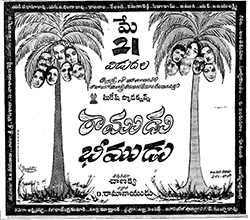Plot
Ramudu, a callow, opulent sole heir clutched and tortured by his spiteful brother-in-law, Panakala Rao. He craves the warm affection of his beloved sister Susheela and nephew Ravi. Bhimudu, a gallant loaf identical to Ramudu, resides in a village with his mother, Venkamma. He is ardent toward stage play taken to task by Venkamma and takes flight. Parallelly, Panakalu fixes an affluent alliance with Ramudu for his self-interest. Anyhow, Leela, the daughter of Ranganatham, rejects Ramudu as a contradiction.
Consequently, knowing how to imperil, Ramudu flees when the two swap in funny contexts. Leela acquits Bhimudu, judging him as Ramudu, and endears after securing her. He lands at Ranganatham's residence, who delivers him to Panakalu but skips. Subsequently, Bhimudu meets his mate Jayaram, the son-in-law of Panakalu's sly manager, Sarabhayya, when they clutch him. After reaching home, Bhimudu detects the atrocities when he aims to chastise Panakalu for Suseela. Next, Panakalu compels him to entrust the property when Bhimudu's reprisal and the sharp shift startle everyone.
Ramudu, as a rover, gets to Bhimudu's village, where the public forcibly surrenders him to Venkamma. At her nurture, he moulds as gentlemanly and falls for Santha, a village belle. Once, he visits her house when a strange bondage arises in Santha's insane grandmother. Subsequently, Bhimudu takes ownership of Panakalu and guards it with Jayaram's aid. Ranganatham proceeds to finalise the match, which Bhimudu denies, excluding fraudulence. On the way back, Ranganatham & Leela notice Ramudu with Santha. Whereat, they denounce Santha, and Ramudu rebukes them, which entails confusion. Santha detests him anywise comprehends after knowledge of the facts.
Since he turns a tough nut to him, Panakalu wiles to victim Bhimudu for an accident. Sensing it, Suseela informs Jayaram, who secures him. In return, he could not withstand Panakalu's striking on his sister and revolts, which led to Panakalu's walkout with Ravi. Now Suseela collapses and puts down Bhimudu for it, so he quits affirming the actuality in a letter. Knowing this fact, Panakalu backs and evicts to seize Bhimudu. Ramudu also discerns that Panakalu has bargained for his property. Hence, he steps toward home, and Panakalu grabs him. Besides, Bhimudu backs and understands the status quo when, as a flabbergast, Santha's grandmother and Venkamma reveal the two as detached twins. Bhimudu hurriedly reverts and divulges the verity when Ranganatham & Leela reach therein. At last, Bhimudu shields Ramudu from Panakalu and reforms him. Finally, the movie ends happily with the marriages of Ramudu & Santha and Bhimudu & Leela.
